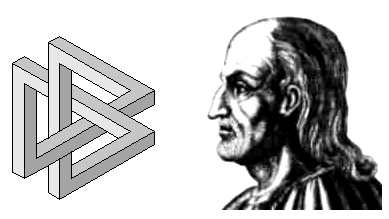Image may be NSFW.
Clik here to view.
“This clears it all up, right?”
Anselm: “Um, no. I must bestow upon it the analytic frown of uncomprehension.”
(image credit)
I used to think I had a great objection to Anselm’s famous ontological argument. (Bear with me – this has something to do with social trinitarianism.) The argument, at least many forms of it, basically goes like this. If it is logically possible that there’s a Greatest Possible Being (i.e. a being such that there’s no logical possibility of there being a greater one), then it is necessary that there’s a Greatest Possible Being. More simply: if it’s possible (non-contradictory) that God exists, then it’s also necessary that God exists (i.e. it is inconsistent to suppose God not existing). (For more, see here and here. For more than you’d ever want to know, here.)
Many critics have replied like this:
I’d be a sucker to grant your premise. Why should I think that the notion of a Greatest Possible Being is the notion of a possible thing at all? Maybe that phrase is like “Two-dimensional triangle with interior angles adding up to 181 degrees” – at first blush, this seems a consistent idea, until you realize that the definition of a 2-D triangle entails that its interior angles add up to 180. Maybe greatness has no top limit – maybe the concept of the Greatest Possible Being is like the concept of a “Highest Possible Positive Integer“. No such thing, of course – for any integer, there a higher one.
My idea was this: part of what makes any being great, is having done good things. So, however great God is, he could always create one more happy creature, or make one more beautiful planet. Heck, even an electron has some objective value. So, no matter how great God actually is, he can’t be a Greatest Possible Being, for there’s another possible world in which God does more great things, and so is greater. If this is right, nothing could be the Greatest Possible Being, and theists should not argue in any way which supposes that a Greatest Possible Being is a possible being.
I then realized, though, that ontological argument proponents were working with an idea of greatness such that greatness supervenes only on essential, intrinsic properties of a being. Theists deny that God essentially has the property of creating this or that creature, or indeed, of creating at all; Christian theists, eager to preserve divine freedom and divine transcendence of the cosmos, almost uniformly say this. Count me in. Perhaps God’s credit, desert, or praiseworthiness is infinitely increasable (because his good works are so), but there’s no reason to deny an upper limit to greatness which supervenes on only essential, intrinsic properties. I’m now sympathetic to some ontological arguments.
But what has any of this to do with the Trinity? In my recent series (here, here, and here) I’ve been discussing the idea that divinity, or maximal perfection, or some essential feature had by God, would logically entail that he’s actually loving something (actually, someone) other than himself. Social trinitarians often lean on this sort of speculation to support their views, although they crucially appeal to the Bible as well. But if I’m right, they’d better stick to the Bible – these arguments ought not convince.
The problem for social trinitarians is this: Do you want to think of God as the Greatest Possible Being, either because you want to advance an ontological argument, or because you find the concept theologically useful? If so, you must stick with a concept of “greatness” where this is a property which supervenes only on essential, intrinsic properties. If you don’t, you’re ontological argument is liable to my objection above. Again, if you adopt a wider concept of greatness, because you want relational properties to count for greatness, so as to argue for multiple persons “in” God, you have no way to block this move: it’s greater to create a good world than to create nothing. Hence, God essentially creates a good world. And you don’t want to say that.
Let me try to put this in the form of an argument, a destructive dilemma.
- Greatness either supervenes only on intrinsic, essential properties, or not.
- If it does, then the property “loving another” isn’t a great-making property (it isn’t intrinsic).
- If the property of “loving another” isn’t a great-making property, then no Anselmian social trinitarian argument is sound.
- If it does not, then properties other than intrinsic and essential ones may contribute to a thing’s greatness.
- If properties other than intrinsic and essential ones may contribute to a thing’s greatness, then some of these other properties are infinitely increasable.
- If some of these properties are infinitely increasable, then the concept of a Greatest Possible Being (GPB) is in fact the concept of an impossible being (in other words, there couldn’t be a GPB).
- If a GPB is an impossible being, then this reasoning is always unsound:
- God is a GPB.
- For any x, if x is a GPB, then x has feature F.
- God has feature F.
- If the above reasoning is unsound, then no Anselmian social trinitarian argument is sound.
- Either way, no Anselmian social trinitarian argument is sound.
Davis’s argument for social trinitarianism turns on the concept of a “perfect being”. If a “perfect being must be a GPB”, then I think the above may refute his argument.
Technorati Tags: social trinity, social trinitarian, impossible Trinity, Anselm, ontological argument, greatest possible being
The post perfection, the Trinity, and impossible beings (Dale) appeared first on Trinities.